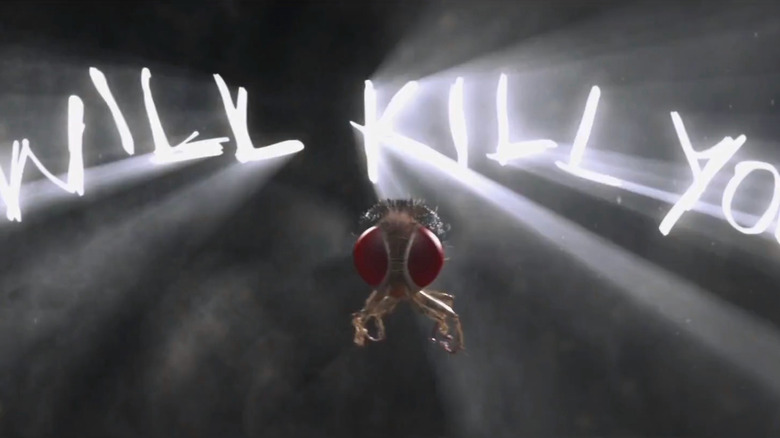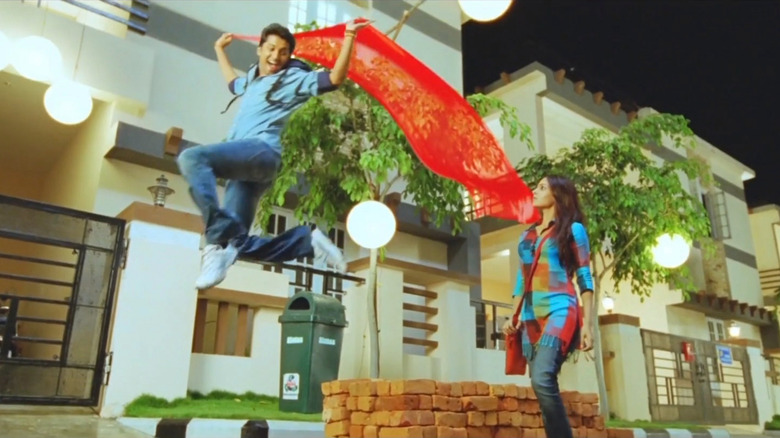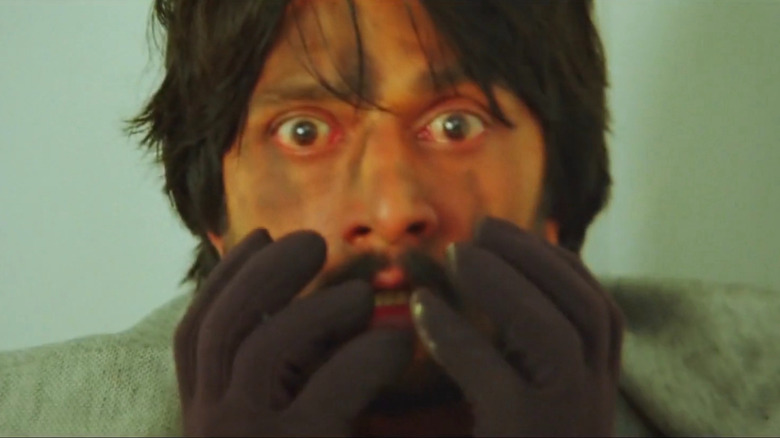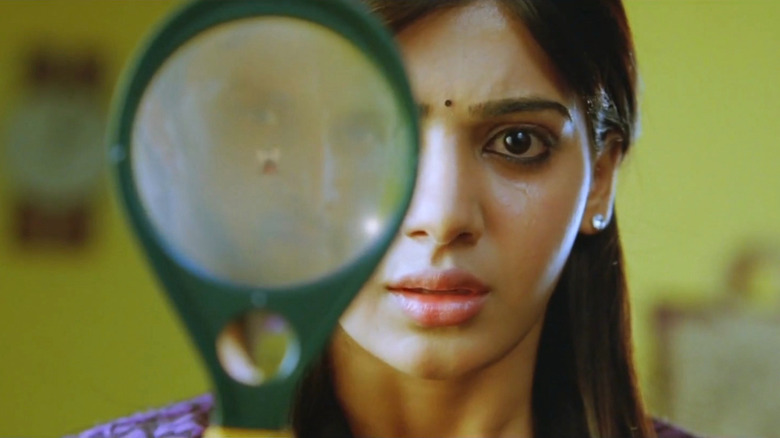RRR Director S.S. Rajamouli Once Made An Action Epic About A Murdered Man Who Is Reincarnated As A Housefly
For genre filmmakers, revenge has been and always will be a plot worth returning to. In terms of storytelling, it makes for a satisfying arc. Someone is wronged, and they set out to right that wrong in what is usually a violent manner, regardless of the degree of the wronging. Revenge makes for easy, clearly defined heroes and villains, and some animal instinct inside of us likes seeing people get what is coming to them, even if the revenge heavily outweighs the initial slight. There's a lot to said about the merits of revenge and whether or not it's actually justice, but in the context of a feature film, it is a reliable narrative trope.
Because it is so well-worn, finding new and inventive ways of depicting revenge can prove incredibly difficult. You can only watch some guy slaughter dozens of people before getting to ultimate Big Bad so many times before you start getting tired. Leave it to S.S. Rajamouli, director of "RRR," to give you a tale of revenge you have never seen before. No, I am not talk about the "Bāhubali" movies, his masterful two-part action epic, which are revenge movies themselves. Their idea of revenge is as classical as it gets. I am talking about the romantic comedy/fantasy/action film he made just before those pictures. I am talking about "Eega."
For those unaware, eega is the word for fly in Telugu, as in the pesky insect you feel so proud to have killed when it annoys you. Rajamouli created a film that gives meaning to that annoyance, because "Eega" is about a man who is killed and reincarnated as a fly seeking revenge against the man who killed him. And yes, it rules.
What is Eega about?
"Eega" centers on a man named Nani (played by Nani, though not playing himself). He is just your average Joe with a deeply intense crush on the girl who lives across the street named Bindu (Samantha Ruth Prabhu). She works for an organization that helps children and spends her free time creating micro art. Bindu is fully aware of Nani's fervent attraction to her, which manifests in some light stalking (and because this is a movie, the stalking is meant to be charming and not creepy), and though she wants to deny it, she is fully attracted to him as well, which quickly evolves to love. The problem is Sudeep (played by Sudeep, though not playing himself), an incredibly shady businessman, also has his eye on her and will do anything to have her, which includes murdering Nani.
Naturally, Nani is reincarnated as a fly and retains all the memories of his past human life. He still loves Bindu with all his heart and will stop at nothing to kill Sudeep, which involves a lot of incredible ingenuity on the part of a fly considering the limitations of the species. Through sheer force of will, Nani makes Sudeep lose his mind. Meanwhile, he also manages to figure out how to present himself to Bindu to show that he is still with her.
Basically, "Eega" is like if the Patrick Swayze/Demi Moore movie "Ghost" was a revenge movie and a wacky comedy, and you, of course, replace a human specter with an insect.
An impressive mixture of tones
Mainstream Indian films have a completely different notion of genre than Hollywood films. In Hollywood, a film basically exists as one thing. Tonal control is key to building the reality of the film. If you are making an action film and decide to throw in a musical number, it will throw off the equilibrium of the picture. Genre deviation in Hollywood essentially boils down to inserting comedic relief, which has basically just involved into commenting on the genre in which you are operating. Well, Indian cinema does not abide by these rules.
This is in part due to a disinterest in realism and a greater emphasis on emotion. Love, friendship, depression, anger, and joy are all elements that operate at a much higher frequency than typical Hollywood fare. Filmmakers like S.S. Rajamouli blatantly play with the emotions of their audience and can crank the dials of each one to their highest setting whenever they so choose. You can go from a buoyant, romantic musical number to a brutal murder within two minutes because the intense emotional whiplash is part of riding on a wavelength of a film like this. Because different genres are better at achieving these emotional beats than others, why not just mix them all together and use whichever one best suits your purpose at any given moment?
For newer viewers to Indian cinema, these tonal and genre shifts can come off as disorienting or even laughable. You often hear films from Bollywood, Tollywood, or any other Indian studio system described as "crazy" or "insane" because of this. They just require you to shift your viewing focus to another part of your brain to be fully enraptured by them, and "Eega" does so splendidly with the absurd and delightful conceit of the fly.
How to watch Eega
Like with the "Bāhubali" films, "Eega" was filmed in both Telugu and Tamil. If you are curious to watch the Tamil version in the United States, you are out of luck. However, as Telugu is S.S. Rajamouli's native language, that is really the version you should be watching anyway. To do that, you have to sign up for Aha, a streaming service you probably are not already signed up for if you live in the west. This is an Indian streaming service that specializes in both Telugu and Tamil language films and television shows. On it, you can also watch "Magadheera," another Rajamouli film that stars one of his "RRR" leads Ram Charan, along with countless others.
If you do not feel up to paying for yet another streaming service (which costs $59.99 for an annual subscription), you can rent or purchase the film on YouTube as well. It is the much cheaper option, but you will not be seeing it Telugu or Tamil. This is the Malayalam dub of the film, which translates to "Eecha." I would recommend getting Aha to watch the film, but you should just watch "Eega" regardless of how you are able to. You are in for an inventive, exciting, and beautiful film that needs to be seen to be believed. Films with this much imagination do not come along often, and when they do, it is our duty as cinema lovers to spotlight them, especially because "Eega" celebrates its 10th anniversary this year. There is no better time to hop aboard a revenge tale truly like no other.



